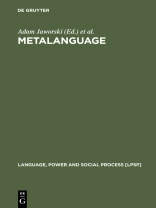Metalanguage brings together new, original contributions on people’s knowledge about language and representations of language, e.g., representations of dialects, styles, utterances, stances and goals in relation to sociolinguistic theory, sociolinguistic accounts of language variation, and accounts of linguistic usage. Drawing on a variety of data sources such as lay and linguists’ metalanguage, the media, parliamentary debates, education, and retail shopping, the book comprises four sections and an integrative commentary. The main thematic parts deal with metalanguage in relation to the following issues: the theory of metalanguage, ideology, social evaluation, and stylisation. Other key themes discussed include constructionism, identity formation, in- and out-grouping, deception, discrimination, manipulation, and the increasing semiotisation of the socio-cultural landscape. Apart from the strictly linguistic concerns, some contributions focus on discourse in a broader sense examining meta-commentary construed in modalities other than language.
The book follows from and complements a great tradition of the study of metalanguage, reflexivity, and metapragmatics, and offers a new, integrating perspective from various fields of sociolinguistics: perceptual dialectology, variationism, pragmatics, critical discourse analysis, and social semiotics. The broad range of theoretical issues and accessible style of writing will appeal to advanced students and researchers in sociolinguistics and in other disciplines across the social sciences and humanities including linguists, communication researchers, anthropologists, sociologists, social psychologists, critical and social theorists. The book includes chapters by Deborah Cameron, Nikolas Coupland, Dariusz Galasinski, Peter Garrett, Adam Jaworski, Tore Kristiansen, Ulrike Hanna Meinhof, Dennis Preston, Theo van Leeuwen, Kay Richardson, Itesh Sachdev, Angie Williams, and John Wilson.
Зміст
Contributors
Introduction
Metalanguage: Why now?
Adam Jaworski, Nikolas Coupland and Dariusz Galasinski
Part 1. Approaches to metalanguage
Introduction to Part 1
Adam Jaworski and Nikolas Coupland
Sociolinguistic perspectives on metalanguage: Reflexivity, evaluation and ideology
Nikolas Coupland and Adam Jaworski
Notes on the role of metapragmatic awareness in language use
Jef Verschueren
Folk metalanguage
Dennis R. Preston
Part 2. Metalanguage and ideological construction
Introduction to Part 2
Adam Jaworski and Nikolas Coupland
Metalanguage in social life
Theo van Leeuwen
Restoring the order: Metalanguage in the press coverage of Princess Diana’s Panorama interview
Dariusz Galasinski
Lying, politics and the metalinguistics of truth
John Wilson
Part 3. Metalanguage and social evaluation
Introduction to Part 3
Adam Jaworski and Nikolas Coupland
Social meaning and norm-ideals for speech in a Danish community
Tore Kristiansen
Adolescents’ lexical repertoires of peer evaluation: Boring prats and English snobs
Peter Garrett, Nikolas Coupland and Angie Williams
Teachers’ beliefs about students’ talk and silence: Constructing academic success and failure through metapragmatic comments
Adam Jaworski and Itesh Sachdev
Part 4. Metalanguage and stylisation
Introduction to Part 4
Adam Jaworski and Nikolas Coupland
Stylised deception
Nikolas Coupland
Metadiscourses of culture in British TV commercials
Ulrike Hanna Meinhof
Retroshopping: Sentiment, sensation and symbolism on the high street
Kay Richardson
Commentary
Out of the bottle: The social life of metalanguage
Deborah Cameron
Index
Про автора
Adam Jaworski is reader at Cardiff University, Wales, UK.
Nikolas Coupland is Professor at Cardiff University, Wales, UK.
Dariusz Galasinski is Professor at the University of Wolverhampton, UK.












